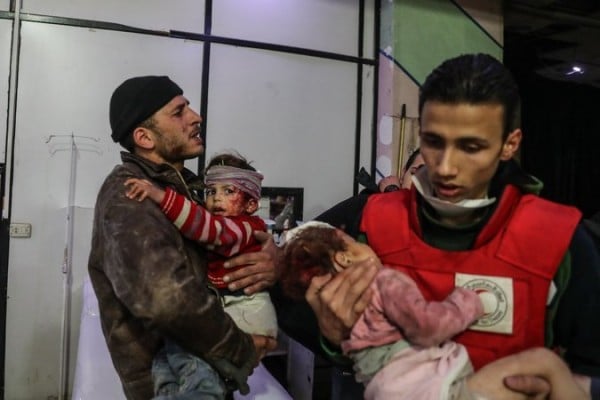UPDATE 1630 GMT: After a meeting with UN Secretary-General Antonio Guterres, Russian Foreign Minister Sergey Lavrov tried to undermine the UN commission and its findings.
“The commission does not travel to the site [but is] using data in social networks. They allegedly interviewed 140 people,” Lavrov said. “We are skeptical about such remote methods.”
A UN commission has concluded that pro-Assad forces committed war crimes and crimes against humanity in their offensive to recapture the East Ghouta area, near Syria’s capital Damascus, this spring.
In a 28-page report to be delivered to the UN Human Rights Council, the panel said that bombardment and a five-year siege, intensfied from 2017, were war crimes:
Following the end of the longest running siege in modern history, the UN Commission of Inquiry [on Syria] has condemned this method of warfare in Syria as barbaric….
Certain acts perpetrated by pro-government forces during the siege laid to eastern Ghouta, including the deliberate starvation of the civilian population as a method of warfare, amount to the crime against humanity of inhumane acts, causing serious mental and physical suffering.
“It is completely abhorrent that besieged civilians were indiscriminately attacked, and systematically denied food and medicine,” the commission’s head Paulo Pinheiro said.
The Assad regime denied the investigators entry into Syria. The report was compiled from about 140 interviews conducted in person in the region and from Geneva, and on photographs, video recordings, satellite imagery, medical records, and accounts from regime and non-regime sources.
“Use of Chemical Weapons in Densely-Populated Areas”
The report also mentioned the regime’s chemical attacks, although it condensed the passage and omitted details of the use of chlorine and/or stronger agents on at least six occasions, including an April 7 attack killing about 50 people in the city of Douma.
See Syria Daily: Scores Killed in Regime Chemical Attacks on Douma
VideoCast with TRT World: The US and Assad’s Chemical Attacks on Douma
The draft summarized:
Government forces and/or affiliated militias continued to use chemical weapons in densely populated civilian areas throughout eastern Ghouta…[in] one of the most grim patterns of attack documented during the period under review.
The final offensive to reoccupy East Ghouta, held by the opposition since 2012, began in early February. The April 7 assault brought the final surrender of rebels and forced removals from the area.
The commission reported that Russian and regime airstrikes and the pro-Assad ground assault killed 1,100 civilians and injured 4,000 others in less than a month from February 18. More than 140,000 people were displaced.
The panel assessed that tens of thousands of residents are still held unlawfully by the regime in a “reprehensible” policy of internment.
One passage in the report centered on “war crimes” by rebels and the jihadist bloc Hay’at Tahrir al-Sham, citing “indiscriminate attacks” on Damascus which had killed and maimed hundreds of civilians. It said “armed groups” had arbitrarily arrested and tortured civilians in Douma, including members of religious minority groups.


Southern Syria rebel’s one central comand for seven military sectors. Regime offensive not yet started.
https://twitter.com/QalaatAlMudiq/status/1009701351738273793
Probable reason of very small use of airpower untill now not to risk a US/Israeli counter. No signs of russian CAS but real offensive not ongoing yet, so will have to wait to see once it kicks off.
https://twitter.com/QalaatAlMudiq/status/1009705440710717440
No reason to use air power. He SAA have far more numbers and greater firepower than the rebels and as you admit, an relatively endless source of supplies.
with out airpower regime is as good as dead.
06/22: The Jordanian Army is sending military vehicles, tanks and soldiers to the Syrian-Jordanian border